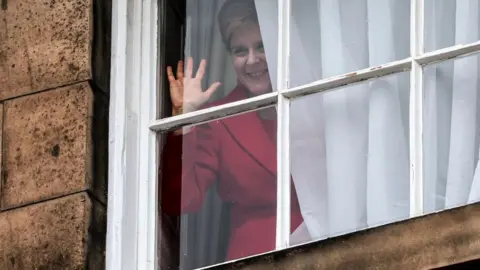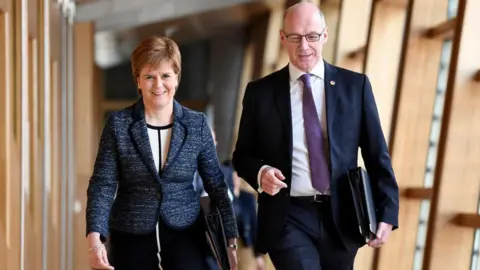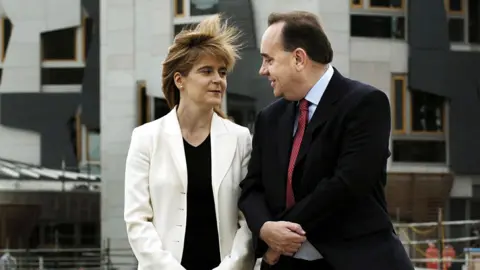Nicola Sturgeon: Why has no one said they will stand to replace her?
 Getty Images
Getty ImagesWhen Alex Salmond quit after the independence referendum, there was little doubt about who would succeed him. Nicola Sturgeon was the obvious candidate and in the end secured the job without anyone challenging her for it.
It was a coronation rather than a contest. There hasn't been a contest for the SNP's top job for nearly two decades. The expectation is there will be one this time but so far there are no official candidates. There are probably several reasons for that.
Firstly, a sense of dignity. Allowing a little space for reflection on Nicola Sturgeon's decision and her contribution to Scottish politics. Not being seen as overly eager. Allowing party bosses to decide the rules.
Secondly, practicality. Her resignation has taken potential candidates by surprise. They did not get much warning that Nicola Sturgeon was about to quit and building a campaign team and assessing potential support within the party takes time.
Thirdly, Nicola Sturgeon's political domination. As she herself acknowledged, it is not easy for others to establish themselves when so much political debate is focussed on a single figure.
While the current first minister has promoted some younger MSPs into her government and once-upon-a-time named Kate Forbes and Humza Yousaf as potential leaders, succession planning has not been the most obvious feature of her tenure.
There is still an array of possible contenders and for some the key decision - to stand or not - may depend on what someone else decides to do.
Don't expect any cabinet minister to formally declare until they hear from the deputy first minister, John Swinney. Vastly experienced in government and hugely popular in the party - only the boldest would stand against him.
If he decides not to go for it - and don't forget he previously served an unhappy spell as SNP leader in the early 2000s when the party was in opposition and far less popular - there could be a wider contest.
 Getty Images
Getty ImagesThe finance secretary Kate Forbes, the constitution secretary Angus Robertson, the health secretary Humza Yousaf and the justice secretary Keith Brown are all considered potential candidates. None have ruled themselves out.
The decision Keith Brown makes is also of particular significance. If he was to stand for leader, he may wish to demonstrate confidence in his candidacy by standing down as SNP deputy leader.
There is no obligation for him to give up the deputy role but if he chose to do so that would trigger a second election contest and the potential for some interesting informal pairings of candidates: male/female, urban/rural, left/right, youth/experience.
To be clear, the two contests would be separate but that did not stop Alex Salmond and Nicola Sturgeon backing one another for leader and deputy in what they styled as a "joint-ticket" in their successful 2004 campaign.
While refugee minister, Neil Gray is understood to be considering running for the top job, some have tipped him as a potential running mate for a more experienced leadership candidate.
Others have suggested the environment minister Mairi MacAllan and transport minister Jenny Gilruth for a similar role.
From innumerable phone calls with SNP politicians and insiders today, my very strong sense is that there is little appetite for an MP becoming party leader.
That's what Alex Salmond did in 2004 when the party was in opposition. However, in government, there is an expectation that the new leader would automatically become first minister and only an MSP can take on that role.
 PA Media
PA MediaThat is a widely perceived as an obstacle to a high profile MP like Joanna Cherry running but she has already ruled herself out. However, her ally in opposition to the gender recognition reform bill Ash Regan - an MSP who resigned as a minister over the issue - is said to be "strongly considering" running.
Any potential candidate will need the support of 100 party members from 20 different SNP branches to qualify.
The party's ruling body - the national executive committee - has decided that nominations will close on Friday 24 February, with voting taking place during a two week period starting on Monday 13 March.
That means the SNP's new leader will be announced on Monday 27 March, making it possible for the winner to take over as first minister later the same week before the Scottish Parliament's Easter break.
The committee has also decided to postpone the SNP conference that had been called to decide the party's independence strategy on Sunday 19 March. The delay will allow the new leader a chance to help shape that debate.
